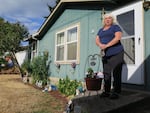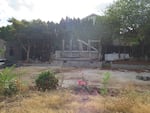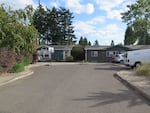In gentrifying Southeast Portland, Kelly Butte Place has been a spot of stability.
All of the residents who live in the small cul-de-sac of mobile homes off Southeast 112th Avenue own their homes and say they had no intention to leave them. Many planned to retire in the community, if they had not done so already.

Sandra Lovingier, 57, bought her home in 2009. If the park closes, she said she'll need to walk away from the house. She plans to live either in a tent or in her car.
Rebecca Ellis / OPB
Come Oct. 20, the park’s residents say the same lot will now be home to a hard-to-miss symbol of displacement: at least 10 manufactured homes, gutted of belongings and awaiting the bulldozer.
Willamette Week first reported last winter that the park’s owner, Adam Hoesly, had asked residents to vacate the property by the end of October, so he could begin construction on 26 single family homes. Hoesly said these houses would be considered affordable by the city’s standards.
For months, the residents have implored the city to intervene, either by preserving the park or helping them pay to hoist their homes onto a truck and move them to a different area — a tricky, laborious process that can cost upwards of $40,000 per home.
Of the 11 families still living there, all but one say they likely do not have the money needed to leave with their homes.

One former residents of Kelly Butte Place has already moved out of the park. They estimate it cost over $60,000 to move the home to a new park.
Rebecca Ellis / OPB
After nearly a year of pleading with city officials, most residents say they believe their best option is to walk away from their biggest investment. Those with mortgages say they’ll declare bankruptcy. One owner, who lives primarily off of $928 a month in disability benefits and money earned through collecting empty cans and bottles, said she plans to live either in a tent or in her car.
“I will have absolutely nowhere to go,” said 57-year-old Sandra Lovingier.
Lovingier, who bought her home in 2009 and suffers from multiple sclerosis, said she’s been thinking for months about finding a spot to camp in Portland. She said she’s leaning toward a site on Mount Hood.
The residents say they’ve done everything they can to get on the city’s radar. They invited Commissioner Dan Ryan, who oversees the housing and permitting bureaus, to come visit. They say he toured the cul-de-sac and offered what was, by all accounts, a sympathetic ear, though a solution has yet to follow. They reached out to the city’s rental services commission asking first for the redevelopment permits to be canceled, and then for the city to buy the park. They were unsuccessful. Residents testified at a vote for the city budget this spring, using their 3-minute time allotment to ask the council for a hand. Commissioner Jo Ann Hardesty said she thought the matter sounded sad and Mayor Ted Wheeler said he hoped Ryan could find a solution.
Three months later, the residents say they’ve lost hope that anyone is coming to their rescue.
“We’re just not getting help. We’re not getting answers,” said resident Lucy Brisack, who lives in Kelly Butte with her husband, her brother, and her 8-year-old-daughter. “We’re not getting anything right now.”
Displacement
The 11 families that still call Kelly Butte home moved there for more or less the same reason. They work low- and middle-income jobs as truck drivers, administrators, and construction workers and wanted to own a home with multiple bedrooms, a front yard and a garage. Portland was running out of options for them.
But at Kelly Butte, they could buy a spacious mobile home, often for less than $100,000, and place it on a plot of land they would rent for $700 a month — their dream home without a price tag deep into the six-figures.
City officials consider mobile home parks like Kelly Butte a critical source of affordable housing. The city’s 2035 Comprehensive Plan, which plans for growth citywide over the next two decades, directs city officials to “encourage preservation of mobile home parks as a low/moderate‐income housing option.” In 2018, the city took steps to protect the parks with a sweeping zoning reform that placed new barriers in front of owners who wanted to turn their park into something more profitable. The new protections required a time-consuming review process and a council vote ahead of any redevelopment.
The reform beefed up protections for all parks in the city but two: Kelly Butte and Strawberry Acres, another mobile home park in Southeast Portland. Those two were exempt because, two months before the council passed the new mobile home protections, developer Adam Hoesly made a buzzer-beater request for permits to redevelop the two parks.
At the time, both parks were owned by Mark Perkins. Hoesly later acquired Kelly Butte from Perkins, but never purchased Strawberry Acres.
Perkins told OPB he did not plan to sell Strawberry Acres to Hoesly. Hoesly said, financially, developing the second park no longer made sense to him.
The residents of Kelly Butte say they should have been told immediately after the permits were submitted by a developer clearly interested in closing the park. But they say no one did.
Two families moved into the park afterwards — sinking tens of thousands of dollars into homes they never would have bought had they known they would soon need to move them. Brisack, who moved to the park in December of 2018, found out through her neighbors that there were permits pending for the park’s redevelopment a few months after she moved in. She said the house always felt temporary to her as a result. She could never bring herself to hang up pictures.
Residents say not notifying them was the first in a series of City Hall missteps. The city would later allow the developer to extend the permits multiple times, meaning the developer could continue to take advantage of the old zoning rules that allowed for easy mobile park redevelopment. Had the city allowed the permits to expire, Hoesly would likely have struggled to close the park.
In February, the city would mistakenly tell the residents they had canceled the permits as Hoesly had let them expire. The city would later walk it back, saying they didn’t realize the developer was safeguarded by COVID-era city protections that granted developers extra time.
Residents maintain it was the city who will be partially responsible for forcing them into bankruptcy, despite promising to protect mobile home communities. And it’s the city, they believe, who should help them avert their looming financial crisis.
City response
Staff within Commissioner Dan Ryan’s office said the issue of Kelly Butte has never left their radar — but they’ve realized there are few good options. The land is likely too expensive to purchase. They say they can not condemn it through eminent domain, as they would need to use the property for something that benefits the wider public. Residents likely make too much money to qualify for the city’s affordable housing programs.
Commissioner Dan Ryan’s office said they are still hoping to prevent the displacement of Kelly Butte residents, and Ryan plans to meet with Hoesly this week. If the two parties can find an alternative to the redevelopment, Ryan’s office said they are considering “additional relocation assistance” to help residents move their homes to other parks.
“Our office has been in consistent contact with the City Attorney’s office, the Portland Housing Bureau, and the Bureau of Development Services regarding any and all options available to us — including refunding BDS fees to Mr. Hoesly — and Commissioner Ryan is committed to preventing the displacement of Portlanders,” said Ryan’s spokesperson Margaux Weeke. “A fair resolution for the residents of Kelly Butte is a top priority for Commissioner Ryan.”
Hoesly told OPB over email that he’s open to new ideas.
“As a developer, I am always open to finding the best use for a property,” he wrote.

Come Oct. 20, the park’s residents say the cul-de-sac they call home will be home to a hard-to-miss symbol of displacement: at least 10 manufactured homes, gutted of belongings.
Rebecca Ellis / OPB
Despite the fact that the city has named displacement one of the most pressing problems facing Portland, the city’s been rocked by a never-ending stream of more urgent crises: gun violence, protests, a pandemic. Some advocates say the long simmering problem of low- and middle-income residents filtering out to the city’s edges has been pushed to the backburner.
The Anti-Displacement Task Force, meant to unite city bureaus and community groups to focus on curbing the outflux of the city’s poorest residents, is about a year behind schedule. The city has not yet recruited members for the group. City officials say it’s not currently a priority.
“No one has had the resources or bandwidth to take on the project as we originally envisioned it,” said Tom Armstrong, a supervising planner with the city’s Bureau of Planning and Sustainability, the city department spearheading the task force.
Housing advocates like Margot Black, who has been organizing residents of Kelly Butte to lobby the city for a solution, said she believes the task force, if it existed, could have pushed the city to come up with more forceful ways to help Kelly Butte residents.
“We’re seeing very strong words and a complete lack of strong results,” she said. “The city continues to just scratch its head and shrug its shoulders and go ‘Gosh I wish there’s something we can do.’”
